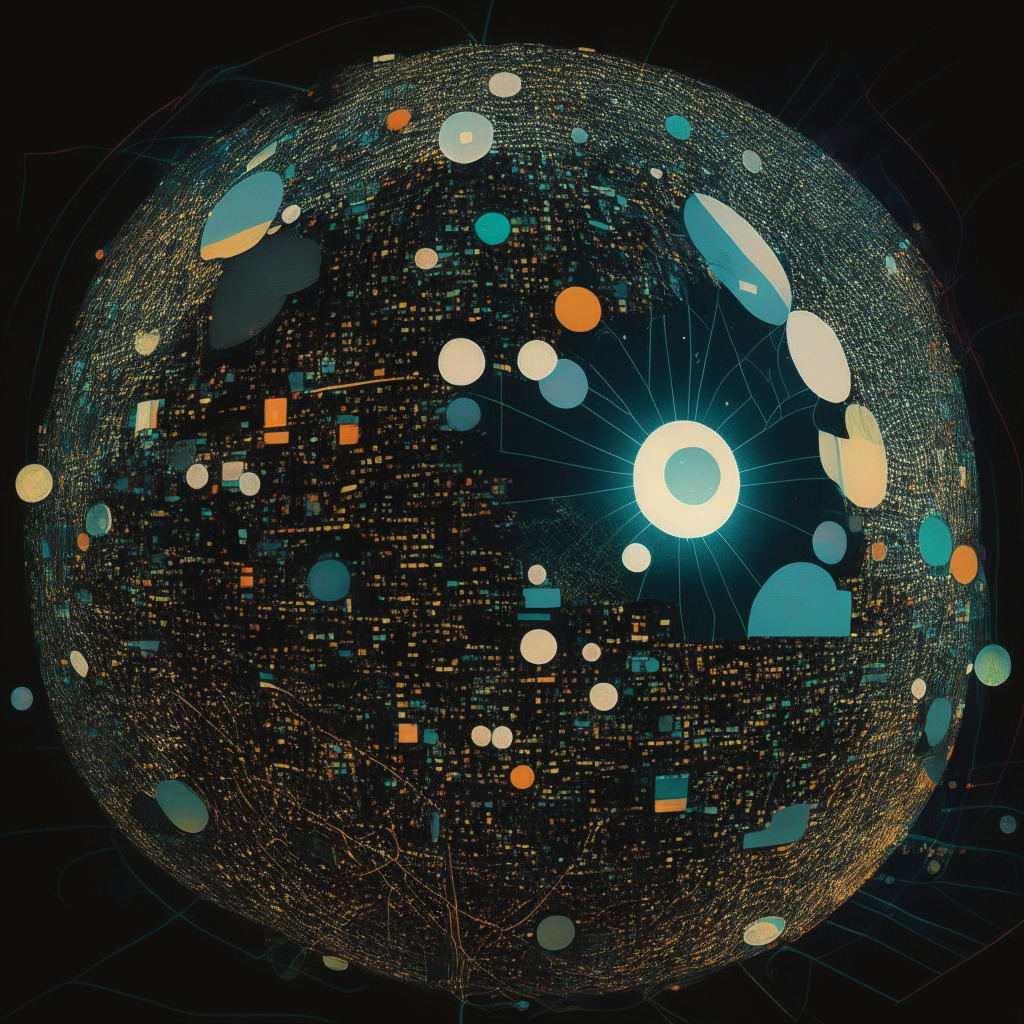“Kenyan parliamentary committee calls for a clampdown on Worldcoin’s operations over data privacy violations. Despite Worldcoin’s skyrocketing popularity, it stirs regulatory turmoil globally. The committee not only demands cessation of Worldcoin but even proposes a new digital asset framework and regulations for cybercrimes and tax reporting.”
Search Results for: Worldcoin
Worldcoin under Kenya’s Scrutiny: Espionage Allegations, Privacy Breaches, and Blockchain’s Regulatory Challenges
Kenyan authorities express concerns over Worldcoin’s operations involving data mining of citizens’ iris scans for cryptocurrency tokens. This prompts questions about potential transnational personal data transfer, violation of the Data Protection Act, and the legal standing of Worldcoin affiliates, underscoring the need for regulation and transparency in blockchain markets.
Worldcoin’s Privacy Protocols Under Scrutiny: Balancing Innovation and User Safety
The unanticipated inspection of Paris-based Worldcoin’s office by France’s data watchdog, the CNIL, has intensified debates over its privacy protocols. This event underscores the strict scrutiny crypto projects are subjected to and the growing worries surrounding user privacy and data storage.
Navigating the Paradox of Worldcoin: Advancing Digital Identification vs Privacy Concerns
Worldcoin, a blockchain venture, recently enrolled over 9500 users in Argentina in one day. The project uses the users’ irises to verify their humanity, to combat AI programs mimicking human interaction. Despite criticisms concerning data privacy, sign-ups continue to surge worldwide. Interestingly, this project presents a paradox when examining technology, balancing digital identity verification against potential privacy compromises.
Worldcoin: Decentralizing Digital Identity or Invading Privacy?
“Worldcoin, despite controversies, showcases a potentially groundbreaking use of blockchain: creating an immutable, biometrically authenticated digital identity. While the project faces both ethical dilemmas and security concerns, its potential in revolutionizing finance, political systems, and social structures cannot be overlooked. A critical question remains: trusting a private entity with our digital identities.”
Worldcoin’s Rising Influence Amid Privacy Fears: A Tale of Economic Access and Data Ethics
Worldcoin, co-founded by Sam Altman, leverages iris scans for online identity verification, drawing both popularity and scrutiny. Despite ongoing data privacy investigations, their novel approach has attracted about 2.2 million people globally since late 2021. However, potential misuse of biometric data raises security concerns.
Regulatory Tightrope in Crypto: Worldcoin’s Controversial Practices VS Digital Euro’s Promise
“The Worldcoin project, known for its retinal scans to differentiate humans from bots, is under scrutiny for potential violations of regulations, including data privacy and security threats. This situation highlights the necessity for balanced regulatory adherence as the crypto-space evolves, emphasizing consumer protection. On a separate note, the introduction of the digital euro could harmoniously coexist with private payment solutions, addressing cross-border payment issues and increasing accessibility.”
Navigating the Ethical Minefield: Worldcoin’s Biometric Crypto Revolution & Its Controversies
“Worldcoin project, with its audacious ambition of creating a biometrically verified digital ID for every global citizen, has reignited global dialogues on data privacy. It’s faced mixed reviews for potentially manipulating less privileged communities by offering wealth in exchange for personal data.”
Kenyan Government’s Inspection of Worldcoin: Balancing Innovation with Regulatory Caution
The Kenyan Government has established a committee to investigate the controversial Worldcoin initiative, with particular emphasis on potential security threats from Worldcoin’s data collection methods including iris scanning. This comes following significant opposition from various regulatory bodies and widespread concern about legal aspects and secure storage for sensitive biometric data.
Kenya Investigates Worldcoin: Blockchain Technology’s Regulatory Challenges Unveiled
“The Kenyan government has assembled a committee to carry out an investigation into the Worldcoin crypto project, raising concerns over its security implications. Simultaneously, courts have postponed Worldcoin’s activities following a lawsuit filed by the office of the data commissioner. Governments worldwide are becoming increasingly vigilant about potential risks associated with cryptocurrency projects, reflecting the growing mainstream acceptance of blockchain technology.”
Investigation on Worldcoin’s Data Privacy – A Closer Look into the Argentinean Scrutiny
Argentina’s Agency for Access to Public Information is investigating Worldcoin’s data privacy methods. The project, backed by OpenAI originator Sam Altman, bestows a digital ID on users through eye-scanning orbs which has raised concerns over infringement of rights.
Iris-Scanning Tech Meets Crypto: The Worldcoin Experiment, Innovation or Just Overreach?
Worldcoin, a crypto initiative utilizing iris-scanning for human identification, recently introduced a reservation feature for unverified users to secure their Worldcoin (WLD) tokens. Despite regulatory hurdles and data privacy concerns, this marks a significant step in expanding its user base.
Worldcoin’s Audacious Move: Biometric Drawbacks Meet Visa’s On-chain Innovation
The Worldcoin project, offering Worldcoin tokens in return for scanning users’ irises to create a biometric ID system, faces skepticism and regulatory challenges globally. Despite announcing overloading of 2 Million customers before launch, the actual usage remains unclear.
Balancing Innovation and Regulation: A Probe into Worldcoin’s Data Practices in Argentina
“The Argentine Agency for Access to Public Information (AAIP) is scrutinizing Worldcoin’s data harvesting practices in Argentina, questioning the balance between innovation provided by blockchain technology and regulatory concerns. This probe into Worldcoin’s security protocols and data processing methods raises skepticism around blockchain entities’ practices and their wider implications.”
Worldcoin’s Launch amidst Ongoing Privacy and Security Reviews: An Uncertain Future
Worldcoin, a blockchain project, launched amid ongoing privacy and security assessments by the Bavarian Data Protection Authority and uncertainty from Germany’s Federal Financial Supervisory Authority. Despite controversies, Worldcoin’s identity verification process using iris scans and AI has gained considerable attention. Authorities’ examinations of Worldcoin’s data flows and user consent transparency continue.
Worldcoin’s Kenyan Controversy: Privacy versus Blockchain Innovation in Crypto Tech
“The recent police raid on Worldcoin’s Nairobi warehouse, in pursuit of collected data, has stirred controversy in Kenya. Concerns have been raised about potential privacy violations and misuse of sensitive iris data by Worldcoin’s project. This episode highlights how emerging crypto technologies are reshaping the discourse around privacy.”
Worldcoin: A New Era of Digital Identity or a Privacy Nightmare? Debating the Pros and Cons
Worldcoin, a novel blockchain technology, offers a unique digital ID through an iris scan, potentially opening up universal basic income opportunities. However, concerns about data privacy, verification issues, and the bleak market for AI tools pose significant challenges. While predicting its success is uncertain, its development signals a ripe opportunity with both risks and rewards.
Worldcoin Nairobi Raid: Compliance Nightmares and the Future of Crypto Regulation in Kenya
“The Kenyan police’s recent raid on Worldcoin’s Nairobi facility raises important questions about transparency and regulation in blockchain and crypto ventures. This event casts a spotlight on the necessity for such companies to not only demonstrate technological prowess but also adhere to compliance norms, maintaining transparency and building trust.”
Worldcoin’s Iris-Scanning Identity Project: Breakthrough Innovation or Data Privacy Nightmare?
“Worldcoin, a digital ID crypto project, introduces a digital identity system based on iris scanning to differentiate humans from AI entities. Despite concerns about data privacy, it has secured $115 million funding and over 2 million sign-ups. However, industry experts question Worldcoin’s ability to manage personal information securely.”
Security Concerns: Worldcoin’s Vision of Privacy in the Blockchain Future vs. Ethical Dilemmas
“Security vulnerabilities were detected in the Worldcoin project’s device, the Orb, which offers cryptocurrency for biometric data. This stirs serious debates about privacy and data use. Despite critics labeling the project a potential ‘dystopian nightmare’, Worldcoin continues its surge with a substantial increase in users and active Orbs.”
WorldCoin’s Iris-Scanning Tech: An Innovative Solution or a Privacy Nightmare?
“WorldCoin, a tech venture by Sam Altman, aims to build the largest financial and identity community through its unique iris-scanning technology. Despite facing regulatory scrutiny and concerns over potential misuse of biometric data, WorldCoin claims to have signed up over 2.2 million users and recently secured $115 million in funding.”
WorldCoin’s Controversial Data Harvesting in Kenya: Opportunity or Threat?
Kenya’s Interior Ministry halts data harvesting initiative by WorldCoin due to contentious data collection methods. Despite assurances for data and transaction security, apprehension remains. WorldCoin’s operations highlight the divide between current legislation and the need for laws accommodating technological innovation and public safety.
Kenya’s Suspension of Worldcoin: A Necessary Security Step or a Hurdle for Crypto Innovation?
Kenya’s suspension of the Worldcoin cryptocurrency project due to security concerns raises questions about the trade-off in security, private data protection, and financial prosperity in the expanding crypto universe. Skepticism exists over Worldcoin’s digital ID system involving sensitive iris scans and potential data misuse. The instance underscores the tension between digital advancement and safeguarding privacy rights in the crypto sphere.
Worldcoin’s Controversial Iris-Scan Tech: Blockchain Innovation or Privacy Nightmare?
“Worldcoin, a crypto protocol that uses iris scans for global identification, has been halted in Kenya due to concerns over data protection. This raises questions on privacy and potential user exploitation in the name of innovation, sparking investigations beyond Kenya’s borders. The crypto community closely watches this as it could define the future of blockchain technology.”
Navigating the Controversy: Worldcoin’s Retinal Scans Stir up Crypto Scepticism and Safety Debates
Worldcoin, a project aiming to authenticate users via retinal scans for a global digital currency, faces scrutiny over its biometric data collection methods from various European authorities concerned about potential user risk. Amidst this flak, Worldcoin is still attracting significant interest, exemplifying the ongoing conflict between fostering innovative growth and ensuring security in the crypto space.
Charting the Future with Worldcoin: Revolutionizing Crypto and Global Identity or Igniting Privacy Concerns?
Worldcoin is a high-profile project blending cryptocurrencies, AI, and blockchain technology to establish a global, transparent identity and commerce system. A unique feature, World ID, utilizes an eye-scanning device that distinguishes human identity from AI robots, while also paving the way for decentralized, token-based commerce and potential income equality solutions.
Navigating the Turbulence: The Dizzying Heights and Depths of Worldcoin’s WLD Token
Worldcoin (WLD) has seen a 70% plunge from its debut price, now stabilizing at around $2.35. This crypto project founded by Sam Altman uses an airdrop linked to eyeball scanning for token distribution. The price of WLD is anchored around $2 until October 2023 due to its initial supply agreement, suggesting an interesting strategy to draw potential users.
The Intriguing Journey of Worldcoin: A Revolutionary Vision or a Privacy Nightmare?
Worldcoin, co-founded by Sam Altman, offers a “digital passport” involving scanning individuals’ irises as a proof-of-personhood and rewarding them with their native token. However, the legality and ethics of its data collection methods and the use of biometrics have been questioned, leading to investigations.
Worldcoin’s Proof of Security Amid Biometric Criticism: A Necessary Evil or Orwellian Nightmare?
“Worldcoin, known for its proof of humanity protocol, faced criticism over data collection practices. Post security audits by Nethermind and Least Authority, 24 out of 26 identified issues were resolved. Unaddressed issues remain a concern despite progress in addressing challenges for this biometric security and blockchain blend.”
Unmasking Worldcoin: The Human-AI Interface and the Quest for Proof-of-Personhood
Worldcoin, a new crypto project, operates on the principle of proof-of-unique-personhood to prevent deep-fake bots. Despite rapid engagement, concerns about potential Orwellian surveillance and exposure of sensitive biometric data have arisen. Advocates argue that the collected data is converted to untraceable hash codes and no raw human data is stored. Ethereum founder Vitalik Buterin underscored the risk of centralized models not fully safeguarding data.
Worldcoin Vs. Privacy Watchdogs: A Crossroad of Cryptocurrency, AI, and Regulation
“Worldcoin’s data collection methods, which involve iris scans for a digital ID and free cryptocurrency, are raising privacy concerns. Despite mixed views on these practices, questions arise about the state and survival rate of systems underpinning data practices in an increasingly digital future.”
Regulatory Scrutiny or Innovation Stifler: Worldcoin’s Retina Scan Controversy
The cryptocurrency Worldcoin, created by OpenAI’s Sam Altman, faces scrutiny from French data protection authority, CNIL, owing to the project’s retina scanning practice. Amid potential regulation concerns, Worldcoin insists on its compliance with the EU’s General Data Protection Regulation (GDPR). This incident underscores the complex relationship between cryptocurrency and regulations.































